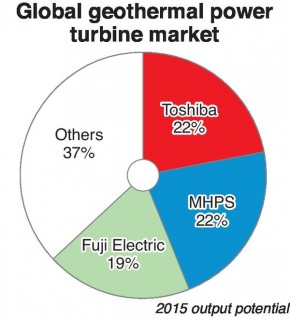Loading
Search
▼ Domestic Firms Eye Africa’s Geothermal Power Sector
- Category:Event
Japanese electronics manufacturers are increasing their presence in Africa’s geothermal power generation sector, amid sluggish growth in orders for equipment for thermal power generation, which emits large amounts of greenhouse gasses.
Toshiba Corp., Mitsubishi Hitachi Power Systems Ltd. (MHPS) and Fuji Electric Co. — the top three geothermal power companies in the world — have all won contracts in Kenya while also aiming to expand their businesses in other countries in Africa.
Kenya has set a target to expand its geothermal power generation capacity to 5 million kilowatts by 2030, compared to about 60,000 kilowatts in 2015.
The country has so far got much of its electricity from hydropower, but power output from this source has been decreasing because of water shortages stemming mainly from climate change and droughts.
Kenya’s expansion of geothermal power has been driven by Japanese firms. Toshiba, for example, has won orders for geothermal power equipment that can generate 280,000 kilowatts in total, while MHPS has got orders for 140,000 kilowatts and Fuji Electric has won bids for 70,000 kilowatts.
According to the Japan Geothermal Association (JGA), the three companies have a global share of more than 60 percent in the market for geothermal power turbines, which make up the core of geothermal power plants.
The three companies’ success in Kenya is helping them develop geothermal power markets in other African countries. Toshiba has exchanged memorandums of understanding on geothermal power development with local companies and other entities in Tanzania, Ethiopia, Djibouti, Uganda and Malawi.
Like Kenya, these countries are located in eastern Africa, an area suitable for geothermal power generation because of its many volcanoes.
In the global electricity generation sector, Chinese companies have used low costs to their advantage in solar and wind power. On the other hand, Japan has for many years developed geothermal power technologies domestically.
Japan has maintained its highly competitive edge because “providing highly efficient power generation that fits with local environments is one of its strengths,” said the JGA secretary general.
There are high hopes for geothermal heat as a resource because it can generate stable amounts of electricity without interruption, unlike solar and wind power generation.
According to the Japan Oil, Gas and Metals National Corporation, about 20 million kilowatts of geothermal power is estimated to be generated worldwide in 2020, about 1.7 times more than that of 2015.
Japan is ranked third in terms of geothermal resources in the world, following the United States and Indonesia. However, many of the areas best suited for power generation are located within national parks or hot spring areas, making them difficult to develop.
This has worked as the main factor limiting Japan’s geothermal power-generating capacity, which has stayed at about 500,000 kilowatts over the past 20 years, prompting Japanese electronics companies to seek overseas markets.
Toshiba Corp., Mitsubishi Hitachi Power Systems Ltd. (MHPS) and Fuji Electric Co. — the top three geothermal power companies in the world — have all won contracts in Kenya while also aiming to expand their businesses in other countries in Africa.
Kenya has set a target to expand its geothermal power generation capacity to 5 million kilowatts by 2030, compared to about 60,000 kilowatts in 2015.
The country has so far got much of its electricity from hydropower, but power output from this source has been decreasing because of water shortages stemming mainly from climate change and droughts.
Kenya’s expansion of geothermal power has been driven by Japanese firms. Toshiba, for example, has won orders for geothermal power equipment that can generate 280,000 kilowatts in total, while MHPS has got orders for 140,000 kilowatts and Fuji Electric has won bids for 70,000 kilowatts.
According to the Japan Geothermal Association (JGA), the three companies have a global share of more than 60 percent in the market for geothermal power turbines, which make up the core of geothermal power plants.
The three companies’ success in Kenya is helping them develop geothermal power markets in other African countries. Toshiba has exchanged memorandums of understanding on geothermal power development with local companies and other entities in Tanzania, Ethiopia, Djibouti, Uganda and Malawi.
Like Kenya, these countries are located in eastern Africa, an area suitable for geothermal power generation because of its many volcanoes.
In the global electricity generation sector, Chinese companies have used low costs to their advantage in solar and wind power. On the other hand, Japan has for many years developed geothermal power technologies domestically.
Japan has maintained its highly competitive edge because “providing highly efficient power generation that fits with local environments is one of its strengths,” said the JGA secretary general.
There are high hopes for geothermal heat as a resource because it can generate stable amounts of electricity without interruption, unlike solar and wind power generation.
According to the Japan Oil, Gas and Metals National Corporation, about 20 million kilowatts of geothermal power is estimated to be generated worldwide in 2020, about 1.7 times more than that of 2015.
Japan is ranked third in terms of geothermal resources in the world, following the United States and Indonesia. However, many of the areas best suited for power generation are located within national parks or hot spring areas, making them difficult to develop.
This has worked as the main factor limiting Japan’s geothermal power-generating capacity, which has stayed at about 500,000 kilowatts over the past 20 years, prompting Japanese electronics companies to seek overseas markets.
- January 15, 2019
- Comment (0)
- Trackback(0)


